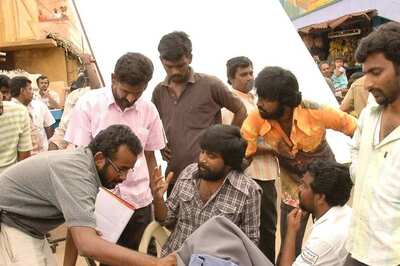
views
Manto
Cast: Nawazuddin Siddiqui, Rasika Dugal
Director: Nandita Das
Manto died in Lahore, Pakistan, in 1955, seven years after the Indian independence. For 35 years, he lived in what he called the love of his life, Bambai (now Mumbai), and spent the rest of it wanting it. His was a life of admiration, stinging tongue, rejection and an indomitable desire to establish himself as the most realistic prose writer of his time.
During the obscenity trial over his short story Thanda Gosht (Cold Meat), Manto (Nawazudin Siddiqui in his best ever performance) lost a friend in Faiz Ahmad Faiz, one of the prominent voices of the progressive writers’ association. Though Faiz argued vehemently in Manto’s favour, he refused to believe that Thanda Gosht met literary parameters. This incident probably destroyed Manto’s faith in new India. Known for his razor sharp quotes, Manto thereafter mellowed down. At one point, he even tells his wife Safia (Rasika Dugal) that he was sorry for what he was doing to her. Despite this, he could never really change.
Read: Manmarziyaan Movie Review
Read: Yamla Pagla Deewana Phirr Se Movie Review
In the film, director Nandita Das has tried to trace Manto’s inspirations in life — brothels, stories of sexual desires, melancholic set-ups. Manto wasn’t happy writing for films, but did so for money. Through his work, he constantly aimed to find flawed characters looking for salvation.
The India-Pakistan partition serves as the film’s backdrop. The then volatile society looking to ease out the anger found a face in Saadat Haasan Manto. He was like the cork of a soda bottle thrust shut after pouring some salt in it. During a scene in the film, the organiser of a literary event says with a deep sigh, “If only we could get these many people in every meeting.”
This is the source of Manto’s strength and also his arrogance or pride, whatever you may want to call it. In his head, he is holding a mirror to the society and people in power. In the film, it is so ironic that when he decides to fight his own case during the obscenity trial, the judge announces his verdict with a sarcastic remark, “I don’t know why they waited this long to pronounce a sentence. Your final argument was enough to get you jailed.”
Read: Happy Phirr Bhaag Jayegi Movie Review
Read: Gold Movie Review
Any attempts at sugar coating reality drives Manto mad. His jokes are on us. Fuelling his raw take on his surroundings, Safia once asks him to write a story on a woman sitting near them in a park. He instead turns up with a story of a woman who shaves and whose boyfriend helps her in it. This may look like an absurd take but it is enough to get you invested in his unique imagery.
Adapting a similar tone, Nandita Das uses small sequences to acquaint us with society’s paradoxes. For instance, Manto is once out in a Lahore market when a youngster screams about Gandhi’s assassination. The vegetable seller asks the young boy — who seems oblivious to the idea of one Hindustan that existed before partition — about the culprit. The boy responds, “Some Hindu has killed him,” and runs away. The old man scolds him from behind and murmurs, “They don’t even have the decency to break a bad news.” There couldn't be a better way to discuss generation gap and how values change in just a few months.
Such is the world that Manto represents, where nobody objects to what others are doing. Nandita Das gives her Manto enough reasons to believe that the world he had left behind was better than the one he was living in. He doesn’t need to put his ‘Hindu topi-Musalman topi’ to use. At least, this is what he thinks.
As Manto’s stories continue to live on, they also add to the artistic merit of this film, providing Nandita Das solid channels to go in and out of his life. There are two stories — one that Manto lives and the other that his readers live. He may be the hero of the first but is a mere guilt-ridden prose writer in the second. In fact, Safia says it out loud once, “Your writing will starve us to death.”
Despite his torment and ambition, Manto could never become the ideal writer for the family to look up to.
There is a scene in the film where he starts hallucinating in the middle of a police raid. He is hearing a song by his friend Shyam Chaddha (Tahir Raj Bhasin) in complete isolation from what is happening around him, and trying to understand the lyrics. The reality of life jolts him back, but he is under obligation to amplify this reality’s power in his writings. This is how he intends to live and die.
It’s a film that will make you think, hurt you and will bring you back to your ideals. Nawazuddin Siddiqui has stripped himself of all the apprehensions and has dived into Manto’s world with unmatched energy, wit and personality. Far from Wasseypur, he has transformed into a writer who has lost everything in the No Man’s Land between India and Pakistan.
Be a part of his poignant, heart-breaking journey.
Rating: 4/5
Interact with Rohit Vats at Twitter/@nawabjha


















Comments
0 comment